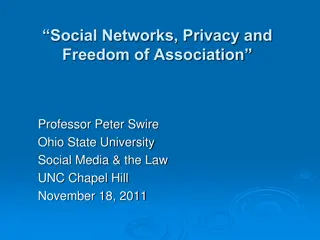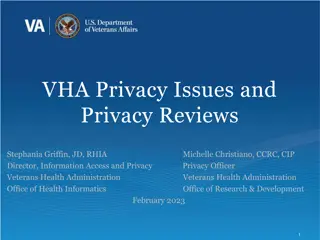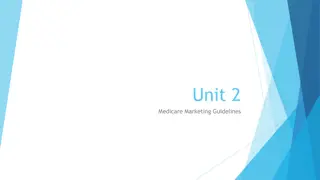Ensuring Client Privacy and Ethics in Antiretroviral Therapy Distribution
This content discusses the ethical principles, definitions of privacy and confidentiality, and the importance of maintaining client information confidential in decentralized drug distribution of antiretroviral therapy in the private sector. It emphasizes the need to protect sensitive information and uphold client privacy rights to improve health-seeking behaviors and trust in healthcare providers.
Download Presentation

Please find below an Image/Link to download the presentation.
The content on the website is provided AS IS for your information and personal use only. It may not be sold, licensed, or shared on other websites without obtaining consent from the author. Download presentation by click this link. If you encounter any issues during the download, it is possible that the publisher has removed the file from their server.
E N D
Presentation Transcript
Session 9 Decentralized Drug Distribution of Antiretroviral Therapy in the Private Sector: Ethics and Client Privacy Protection
Learning objectives By the end of this session, participants will be able to: Explain the requirements for ensuring client privacy and confidentiality before, during, and after provision of refills Provide refills in a way that does not cause stigma and unintentional disclosure of the client s HIV status Discuss how to behave ethically before, during, and after providing client refills
Overview of ethical principles The three major ethics principles in clinical settings are: Respect: Refers to respecting the decisions of patients and protecting those who may be unable to make decisions for themselves (e.g., mentally challenged, elderly, children, marginalized people). Beneficence: Responsibility of the clinician/pharmacist to act in the best interests of clients. This requires minimizing risk to levels that are acceptable given the potential benefits of the treatment. Justice: People should be treated fairly, with benefits and burdens distributed fairly in society.
Definitions Privacy: Right to keep things to oneself, be left alone, and make decisions about how personal information is shared. Confidentiality: Right to keep things about oneself from being disclosed to others. Professionals who have access to client records or communication are obligated to keep that information in confidence. Security: Measures put in place to protect paper- based and digital data during storage, transfer, and use from being accessed by unauthorized users.
Why keep client information confidential? Privacy and confidentiality are key to successful health provider-client relationship and necessary for optimizing outcomes Improves client/patient confidence in health system and encourages positive health-seeking behaviors Clients more likely to trust health providers if know their personal information remains safe from unauthorized disclosure Protects clients from HIV stigma and discrimination within the community
What is considered sensitive information? Sensitive client information requiring protection includes: Any information in a medical record that can be used to identify an individual Information obtained, created, used, or disclosed in the course of providing a health care service (diagnosis or treatment) Client medical history Laboratory test results Medicines/drug pick-up records Client contact information Family history Data concerning a person s sex life or sexual orientation
Breaches of confidentiality Accidental disclosures (inadvertent actions, unintentional mistakes) Insiders (e.g., neighbor, friend, family member) accessing client information without client s knowledge/approval Uncontrolled secondary usage of client information for purposes other than intended without client s authorization; sharing of passwords with unauthorized individuals Unauthorized access (hacking or use of another s password)
How to protect client information When speaking to a client, ensure you are in a location with visual and audio privacy. Never discuss client information with unauthorized personnel. Limit access to personal information only to those who need to know (e.g., those who need the information for decisions about client care). Use secure passwords for accessing electronic data, lockable storage for physical records, and covered folders for patient charts/files. Use encrypted storage or devices and ensure that client information is de-identified. Maintain data integrity when transferring information (e.g., verify that the information arrived as it was sent and was not modified in any way). Train all personnel with access to client information on procedures for protecting this information.
Breaches of confidentiality Provider may disclose information without a client s consent when they: Are involving other health care personnel in providing care to the individual (multidisciplinary team) Are required by law to inform the authorities Believe client will seriously harm self or someone else Client/patient must be told when and why the information is being disclosed
Informed consent and confidentiality Key issues to consider: All clients must provide written informed consent agreeing to be devolved to decentralized drug distribution of antiretroviral therapy. Clients should be allowed to decide whether to be devolved without any persuasion or coercion. Reassure clients that their private information will not be disclosed to any third party without their permission. Make sure safeguards are in place and that client information/test results are safe from unauthorized access.

















































